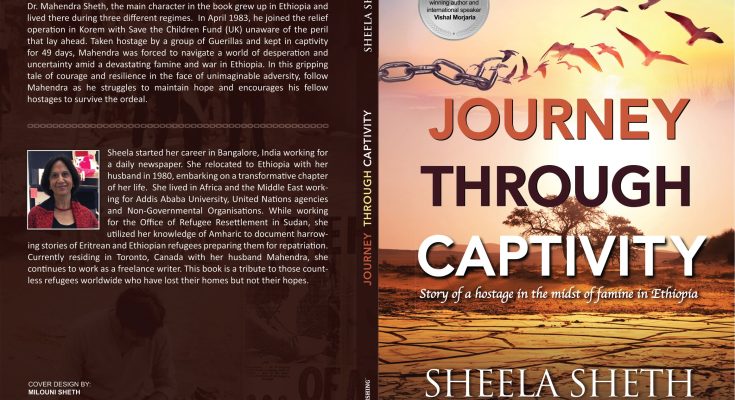By Renu Mehta, Toronto
In her gripping book, Journey Through Captivity, author, Sheela Sheth recounts the gripping tale of abduction during the Ethiopian Famine of 1983. The narrative unfolds over 49 days of captivity, revealing reflections, reactions and revelations that transform lives of displaced refugees. It vividly portrays Ethiopia’s evolution across three regimes while exploring the intricate dynamics between captors and captives in the beautiful yet mysterious landscape. The book delves into the challenges faced by refugees, the coping strategy in hostage situations, and the resilience of human spirit in the face of adversity.
Q. The setting of the book is unique. How did you choose the backdrop for your story, and why is it significant to the narrative?
A. Selecting the setting was influenced by a real life event which took place in Korem in 1983 during the famine in Ethiopia. It is a journey of the main character in the story who was held captive for 49 days by a rebel group and taken as a hostage through the Tigray terrain. The backdrop of the story is the desert terrain through which he travelled facing the challenges and life threatening moments.
Q. Your character seems quite intriguing. Can you tell us about the protagonist and any challenges they face in the story?
A. The main character of the book is my husband Mahendra whose life was exciting and rewarding, worth the exhaustion and uncertainties. It is a compelling story of reflections, reactions and revelations of a hostage in the midst of famine and war in Ethiopia. Journey through captivity is a reflection of the character’s inner self, his confidence laced with positivity weaving along the rugged contours of a fractured coastline. Taking one day at a time and marshalling medical services by becoming the official doctor for the group was an indication of resilience in the face of sensory overload.
At one end, is the quiet sophistication of perfectly manicured meadows and the other end is the empty quarters of an arid desert landscape. The flashbacks were a proof of life lived but also a sign of social withdrawal, frozen fright and a survival strategy.
Q. Readers often connect with authors on a personal level. How much of yourself do you see in the characters or the storyline?
A.There is a lot of me in the story as I am the spouse of the captive. Since I am the author of the book connected closely to the situation, my social stance was highly disturbing. Controlling my emotions, fears and uncertainty in life became a part of my personality. It was the time when I had two little children to take care of and I had no one to share my feelings with. I became a silent spectator to what was going on around me and I started withdrawing myself from social life. I am sure the readers would connect with me especially those facing mental challenges and also those folks whose life is never without some kind of loss.
Q. Can you give us a brief overview of what inspired you to write “Journey through Captivity”?
A. In 2019, With Covid, the entire lifestyle changed, and we started staying more and more indoors. I had more time on hand to organize, read and concentrate on my personal writings. It was the time to document life and leave a legacy behind for generations to come. Day in and day out, we were losing dear ones to the wrath of Covid.
This was the time I felt I had to hurry up and race with time. I started preparing an outline. I had lived through those times with my husband, so he became my inspiration and I started this morning ritual of interviews and recorded clips to help me formulate an outline. I started following Memoir networks and read books to give me a trail to follow. Now I had clarity of thought and vision to bring clips, pictures and a journal to life to write a real life story.
Q. How did you come up with the concept and what message are you hoping to convey through it?
A. I realized visuals and pictures speak a thousand words. It would give the reader an insight into my personal life and connect me with the readers and open corridors of appreciation to those small town folks from where we started our life journey.
Q. What do you think the readers will take away from “Journey through Captivity”?
A. As we know, Memoirs are a way to reclaim the past, to build a bridge between who we once were and who we have become and the experiences that shaped us. Embracing the challenges and keeping calm in extreme circumstances was a mental adjustment. It taught me the value of small pleasures in life and to appreciate little things which are often taken for granted. Life is a circle. The end of one journey was preparing me to embark the beginning of the next stage in life. Positivity in life can be rewarding as one says there is always light at the end of the tunnel.
Copies of “Journey Through Captivity” are available for purchase at Amazon https://www.amazon.com/dp/B0CMNV94BK?ref_=pe_3052080_397514860.





